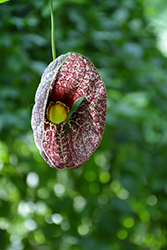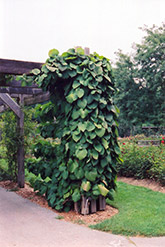Height: 30 feet
Spread: 24 inches
Sunlight:
![]()
![]()
Hardiness Zone: 4
Description:
An extremely vigorous vine, excellent for quick screening, almost invasive; highly interesting purple flowers and oddly shaped fruit, often lost in the foliage; large leaves provide good shade for pergolas or arbors
Ornamental Features
Dutchman's Pipe features unusual light green tubular flowers along the branches in mid spring. It has dark green deciduous foliage. The heart-shaped leaves do not develop any appreciable fall color.
Landscape Attributes
Dutchman's Pipe is a dense multi-stemmed deciduous woody vine with a twining and trailing habit of growth. Its strikingly bold and coarse texture can be very effective in a balanced landscape composition.
This woody vine will require occasional maintenance and upkeep, and is best pruned in late winter once the threat of extreme cold has passed. It has no significant negative characteristics.
Dutchman's Pipe is recommended for the following landscape applications;
- Hedges/Screening
- General Garden Use
Planting & Growing
Dutchman's Pipe will grow to be about 30 feet tall at maturity, with a spread of 24 inches. As a climbing vine, it tends to be leggy near the base and should be underplanted with low-growing facer plants. It should be planted near a fence, trellis or other landscape structure where it can be trained to grow upwards on it, or allowed to trail off a retaining wall or slope. It grows at a fast rate, and under ideal conditions can be expected to live for approximately 20 years.
This woody vine does best in full sun to partial shade. It prefers to grow in average to moist conditions, and shouldn't be allowed to dry out. It is not particular as to soil type or pH. It is highly tolerant of urban pollution and will even thrive in inner city environments. This species is native to parts of North America.

